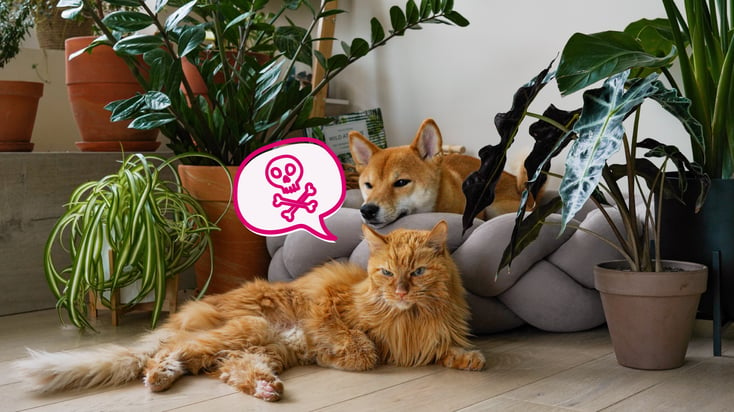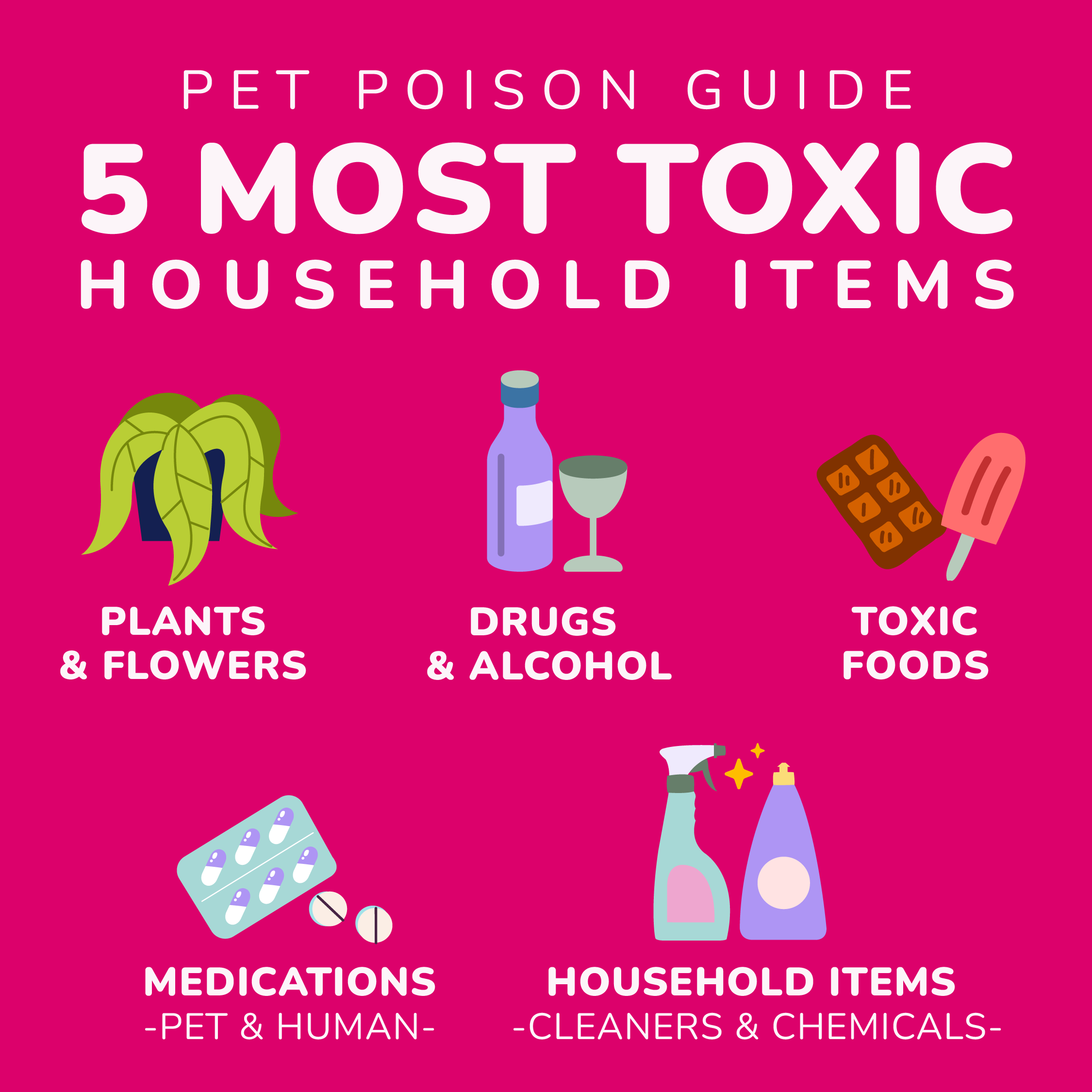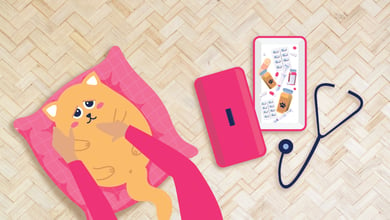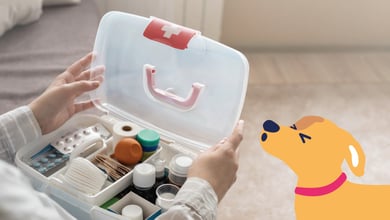Pet Poison Guide: 5 Most Toxic Household Items

Table of Contents
Did you know that everyday items around your home could pose hidden dangers to your pets? Accidents like a cat knocking over meds or a pup chewing a plant can occur more frequently than we realize, sometimes leading to pet poison incidents.
As a veterinarian with BetterVet, I know the importance of educating pet parents about keeping our furry companions safe from pet poisons.
Key Takeaway:
Awareness of toxic household items, such as certain plants, medications, and cleaning agents, is vital to protect pets. Keep these away from pets and consult a vet immediately if ingestion occurs.
In this blog post. I’ll guide you through the most common household hazards, from cleaning products to dangerous foods, and help you make your home safer for your pets.

1. Plants and Flowers
Many common plants and flowers can be harmful if your pet nibbles on them.
Here's an alphabetized list for easy reference to help you identify and avoid potential hazards during walks or in your yard:
-
Almond, apricot, cherry, nectarine, peach, and plum trees and shrubs
-
Aloe Vera
-
Amaryllis
-
Autumn crocus
-
Azalea
-
Castor Bean
-
Cyclamen
-
Chrysanthemum
-
Corn Plant
-
Daffodils
-
Daphne
-
Dieffenbachia
-
Dogbane
-
English Ivy
-
Foxglove
-
Golden Pothos
-
Hibiscus
-
Hyacinth
-
Hydrangea
-
Kalanchoe
-
Lilies: Daylily, Gloriosa Lily, Lily-of-the-Valley, Peace Lily, True Lily
-
Mother-in-Law Tongue
-
Mountain Laurel
-
Narcissus, Daffodil, Paperwhite, and Jonquil
-
Oleander
-
Philodendron
-
Poinsettia
-
Rhododendron
-
Rosary Pea
-
Schefflera
-
Stinging Nettle
-
Tulips
-
Yesterday, Today, and Tomorrow Plant
-
Yew Bush
Are You a Pet Safety Expert?
1. Which one of the plants below is toxic to cats if ingested?
2. Which of the foods below is generally considered safe for your dog to eat?
3. Above what temperature is too hot to leave a pet in your car?
4. Which kind of leash is the safest to walk your dog?
5. True or False: If a medication is safe for humans, it is probably safe for pets.
6. What should you do if you think your pet ate something toxic?
View Results
Are You a Pet Safety Expert?
1. Which one of the plants below is toxic to cats if ingested?
2. Which of the foods below is generally considered safe for your dog to eat?
3. Above what temperature is too hot to leave a pet in your car?
4. Which kind of leash is the safest to walk your dog?
5. True or False: If a medication is safe for humans, it is probably safe for pets.
6. What should you do if you think your pet ate something toxic?
Share Quiz
2. Medications
Keep the following medications out of reach and use child safety locks for added security, as they can be dangerous for pets to ingest.
These include human medications, like ibuprofen, and pet medications, such as heartworm and flea preventatives.
Human Medications
-
Prescription medications
-
Cold medications
-
Herbal supplements
-
Ibuprofen
-
Naproxen
-
Topical prescriptions
Pet Medications
-
Heartworm Preventatives
-
Flea & Tick Preventatives
-
Supplements
3. Household Items
Did you know items in your household could be hazardous to your pets? From cleaning products like bleach to paints and pesticides, many contain toxins harmful to cats and dogs. Besides ingestion, some of these items can cause skin or respiratory irritation.
Keep the following household items out of reach to protect your pets:
-
Ant poison
-
Antifreeze
-
Batteries
-
Bleach and detergents
-
De-icing chemicals and salts
-
Expandable foam insulation
-
Fabric softener sheets
-
Fertilizers and herbicides
-
Glue
-
Household cleaners, including drain and shower cleaners
-
Insecticides
-
Linoleum
-
Paint and Paint Thinner
-
Pool chemicals
-
Rodent poisons and baits (as well as poisoned vermin)
-
Slug Bait
-
Tar
4. Drugs and Alcohol
Our furry friends can become seriously ill if they ingest drugs or alcohol. These substances can induce vomiting, diarrhea, or even seizures! To keep your pet safe, here's a list of items to avoid:
-
Marijuana: edibles and various forms like flowers, buds, joints, and roaches
-
Recreational drugs
5. Human Foods
Not all foods are safe for our furry friends! Some everyday items can make your pet sick. For instance, chocolate contains substances like caffeine and theobromine, both toxic to dogs and cats. Similarly, xylitol, often found in sugar-free products, can be highly toxic to dogs.
Here's a list of unsafe human foods for pets:
-
Caffeine in any form (coffee, tea, soft drinks, etc.)
-
Chives
-
Chocolate
-
Garlic
-
Grapes and raisins
-
Leeks
-
Onions
-
Macadamia nuts
-
Raw yeast dough
-
Raw or undercooked meat
-
Xylitol (often found in sugar-free gum)
Although there are a variety of foods we eat that our pets can not, here's our list on the safe human foods for pets.
What to Do if Your Pet Eats Something Toxic
If you suspect your pet has ingested something toxic, contact an emergency veterinary clinic or the Pet Poison Helpline immediately.
They're available 24/7 at (855) 764-7661 or visit petpoisonhelpline.com for further guidance.
Conclusion
This guide has given you the knowledge to keep your furry friend safe. But even the best pet parents face surprises! If you think your pet might have eaten something toxic, don't wait! Call your veterinarian or poison control right away.
For less severe cases, our home veterinary visits are also available if you need further peace of mind.
The list provided is not a complete list of all possible household items that could lead to poisoning in your pet. When in doubt, contact the Pet Poison Helpline for further information and guidance.
Hassle-free In-Home Pet Sick Visits
When your pet isn't feeling well, the last thing you want is a stressful trip to the vet. Our in-home sick pet visits offer a calm, stress-free alternative.
Frequently Asked Questions
Are poinsettias poisonous to pets?
Yes, poinsettias can irritate the mouth and stomach if ingested by pets, but generally symptoms are mild and self-limiting with supportive care.
Are hibiscus poisonous to pets?
While ingestion of Hibiscus plants is unlikely to cause serious harm to your pets, ingestion may cause mild gastrointestinal upset.
Are orchids poisonous to pets?
Orchids are considered non-toxic to pets and are safe to have around them.
Are lilies poisonous to pets?
Yes, lilies are highly toxic to pets. Ingestion of any part of the lily plant including the leaves, stems, petals, and even the pollen can lead to severe toxicity. A small ingestion can cause kidney failure and death in cats.
Is xylitol toxic to cats?
While xylitol is highly toxic to dogs, its effects on cats are not well understood. If you suspect your cat has ingested something with xylitol, contact your veterinarian immediately.





